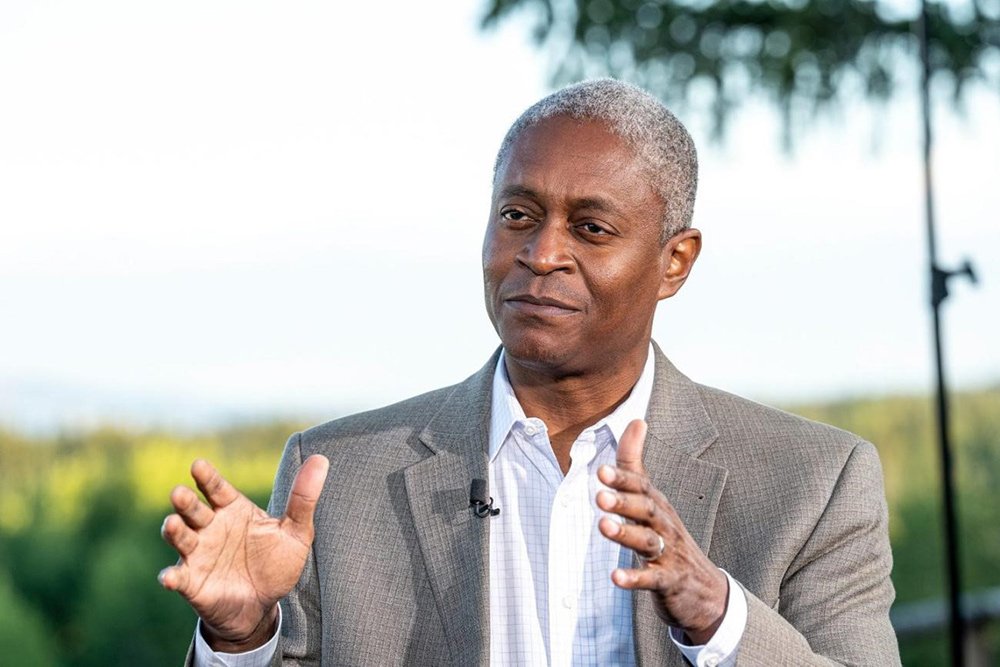
美聯(lián)儲從2022年初以來10次加息以遏制物價上漲,但通貨膨脹率仍然居高不下,。在本月早些時候的最近一次加息中,,美聯(lián)儲暗示可能會暫停加息。
但現(xiàn)在,,亞特蘭大聯(lián)邦儲備銀行行長博斯蒂克認為短期內(nèi)不會降息,。事實上,降息可能要等到2024年,。
博斯蒂克周一在接受美國全國廣播公司財經(jīng)頻道(CNBC)的《財經(jīng)論談》(Squawk Box)節(jié)目采訪時表示:“我的基線案例(利用牛津模式所做的預(yù)測,,條件是未對任何變量施加沖擊)是,在2024年之前,,我們不會真正考慮降息,。在我看來,通脹不會那么快回落,,因此,,降息并不真正適合這種情況?!?
亞特蘭大聯(lián)邦儲備銀行行長表示,,即使在美聯(lián)儲內(nèi)部,關(guān)于加息對經(jīng)濟的影響有多嚴重的爭論也在持續(xù),。不過,,就目前而言,這些數(shù)據(jù)可能表明,,對抗通脹的時間可能比許多人意識到的要長,。
博斯蒂克表示:“我們所看到的情況是,通脹率一直居高不下,,消費者在支出方面非常有彈性,,勞動力市場仍然非常緊張。所有這些都表明,,價格仍將面臨上行壓力,?!?/p>
他指出,一系列加息已將通脹率從6月份9.1%的40年高點降至上個月的4.9%,。盡管通脹率呈下降趨勢,,但仍遠高于美聯(lián)儲2%的目標。
博斯蒂克表示:“如果你看看大多數(shù)通脹指標,,就會發(fā)現(xiàn)目前的通脹率仍然是美聯(lián)儲目標水平的兩倍,。所以還有很長的路要走?!彼€補充說他對美聯(lián)儲未來幾個月的建議是“上調(diào)”利率,。
博斯蒂克的鷹派言論是在美聯(lián)儲暗示可能停止激進加息的幾周后發(fā)表的。許多投資者曾希望美聯(lián)儲停止加息,,這一點已在股市中反映出來,。一些專家擔心,加息會使經(jīng)濟增長放緩,,從而導(dǎo)致經(jīng)濟衰退,。其他人則表示,即使通脹降溫,,降息也不會很快到來,。但博斯蒂克認為,即使出現(xiàn)衰退,,加息也可能繼續(xù),。
這位亞特蘭大聯(lián)邦儲備銀行行長已經(jīng)明確表示,只要通脹處于高位,,美聯(lián)儲就必須堅持加息路線,。今年1月,對美聯(lián)儲政策沒有投票權(quán)的博斯蒂克表示,,美聯(lián)儲官員必須在抗擊通脹的斗爭中“堅持到底”,,他說,加息將消除經(jīng)濟中的過度需求,。
2月,,在美聯(lián)儲加息后,博斯蒂克對彭博社表示:“我們的首要任務(wù)無疑是控制通脹,。我將盡我所能確保我們做到這一點,。”
博斯蒂克說,,他的觀點取決于經(jīng)濟數(shù)據(jù),,比如經(jīng)濟數(shù)據(jù)是指向經(jīng)濟增長強勁還是降溫。
降息受到許多專家的支持,,他們認為通貨膨脹已基本得到控制,。賓夕法尼亞大學沃頓商學院(University of Pennsylvania’s Wharton School of Business)的金融專家杰里米?西格爾(Jeremy Siegel)說,,在經(jīng)歷了動蕩的2022年之后,如果美聯(lián)儲降息,,今年股市的回報率可能會上漲15%或更多,。但西格爾表示,如果美聯(lián)儲不降息,,未來的道路可能會更加艱難,。
除了通脹,美聯(lián)儲還面臨著其他一些挑戰(zhàn),,包括銀行貸款活動放緩帶來的潛在信貸緊縮,,以及2023年前幾個月的一系列銀行倒閉事件。此外,,它還必須應(yīng)對當前的債務(wù)上限危機。在這場危機中,,白宮和國會尚未就美國政府為履行其財政義務(wù)所能借入的資金上限達成一致,。
紐約聯(lián)邦儲備銀行(New York Fed)行長約翰·威廉姆斯(John Williams)本月早些時候表示,他將密切關(guān)注銀行業(yè)問題對美國經(jīng)濟的影響,,并表示今年不會降息,。
據(jù)彭博社報道,威廉姆斯表示:“在我的基準預(yù)測中,,我沒發(fā)現(xiàn)今年有任何理由降息,。”(財富中文網(wǎng))
譯者:中慧言-王芳
亞特蘭大聯(lián)邦儲備銀行(Atlanta Fed)行長拉斐爾·博斯蒂克(Raphael Bostic)認為,,美聯(lián)儲直到“2024年”才會降息,。
美聯(lián)儲從2022年初以來10次加息以遏制物價上漲,但通貨膨脹率仍然居高不下,。在本月早些時候的最近一次加息中,,美聯(lián)儲暗示可能會暫停加息。
但現(xiàn)在,,亞特蘭大聯(lián)邦儲備銀行行長博斯蒂克認為短期內(nèi)不會降息,。事實上,降息可能要等到2024年,。
博斯蒂克周一在接受美國全國廣播公司財經(jīng)頻道(CNBC)的《財經(jīng)論談》(Squawk Box)節(jié)目采訪時表示:“我的基線案例(利用牛津模式所做的預(yù)測,,條件是未對任何變量施加沖擊)是,在2024年之前,,我們不會真正考慮降息,。在我看來,通脹不會那么快回落,,因此,,降息并不真正適合這種情況,。”
亞特蘭大聯(lián)邦儲備銀行行長表示,,即使在美聯(lián)儲內(nèi)部,,關(guān)于加息對經(jīng)濟的影響有多嚴重的爭論也在持續(xù)。不過,,就目前而言,,這些數(shù)據(jù)可能表明,對抗通脹的時間可能比許多人意識到的要長,。
博斯蒂克表示:“我們所看到的情況是,,通脹率一直居高不下,消費者在支出方面非常有彈性,,勞動力市場仍然非常緊張,。所有這些都表明,價格仍將面臨上行壓力,?!?/p>
他指出,一系列加息已將通脹率從6月份9.1%的40年高點降至上個月的4.9%,。盡管通脹率呈下降趨勢,,但仍遠高于美聯(lián)儲2%的目標。
博斯蒂克表示:“如果你看看大多數(shù)通脹指標,,就會發(fā)現(xiàn)目前的通脹率仍然是美聯(lián)儲目標水平的兩倍,。所以還有很長的路要走?!彼€補充說他對美聯(lián)儲未來幾個月的建議是“上調(diào)”利率,。
博斯蒂克的鷹派言論是在美聯(lián)儲暗示可能停止激進加息的幾周后發(fā)表的。許多投資者曾希望美聯(lián)儲停止加息,,這一點已在股市中反映出來,。一些專家擔心,加息會使經(jīng)濟增長放緩,,從而導(dǎo)致經(jīng)濟衰退,。其他人則表示,即使通脹降溫,,降息也不會很快到來,。但博斯蒂克認為,即使出現(xiàn)衰退,,加息也可能繼續(xù),。
這位亞特蘭大聯(lián)邦儲備銀行行長已經(jīng)明確表示,只要通脹處于高位,,美聯(lián)儲就必須堅持加息路線,。今年1月,,對美聯(lián)儲政策沒有投票權(quán)的博斯蒂克表示,美聯(lián)儲官員必須在抗擊通脹的斗爭中“堅持到底”,,他說,,加息將消除經(jīng)濟中的過度需求。
2月,,在美聯(lián)儲加息后,,博斯蒂克對彭博社表示:“我們的首要任務(wù)無疑是控制通脹。我將盡我所能確保我們做到這一點,?!?/p>
博斯蒂克說,他的觀點取決于經(jīng)濟數(shù)據(jù),,比如經(jīng)濟數(shù)據(jù)是指向經(jīng)濟增長強勁還是降溫,。
降息受到許多專家的支持,他們認為通貨膨脹已基本得到控制,。賓夕法尼亞大學沃頓商學院(University of Pennsylvania’s Wharton School of Business)的金融專家杰里米?西格爾(Jeremy Siegel)說,,在經(jīng)歷了動蕩的2022年之后,如果美聯(lián)儲降息,,今年股市的回報率可能會上漲15%或更多。但西格爾表示,,如果美聯(lián)儲不降息,,未來的道路可能會更加艱難。
除了通脹,,美聯(lián)儲還面臨著其他一些挑戰(zhàn),,包括銀行貸款活動放緩帶來的潛在信貸緊縮,以及2023年前幾個月的一系列銀行倒閉事件,。此外,,它還必須應(yīng)對當前的債務(wù)上限危機。在這場危機中,,白宮和國會尚未就美國政府為履行其財政義務(wù)所能借入的資金上限達成一致,。
紐約聯(lián)邦儲備銀行(New York Fed)行長約翰·威廉姆斯(John Williams)本月早些時候表示,他將密切關(guān)注銀行業(yè)問題對美國經(jīng)濟的影響,,并表示今年不會降息,。
據(jù)彭博社報道,威廉姆斯表示:“在我的基準預(yù)測中,,我沒發(fā)現(xiàn)今年有任何理由降息,。”(財富中文網(wǎng))
譯者:中慧言-王芳
Raphael Bostic, Atlanta Fed President, doesn't see rate cuts till "well into 2024."
DAVID PAUL MORRIS—BLOOMBERG/GETTY IMAGES
Inflation remains high even after the Federal Reserve hiked interest rates 10 times since early 2022 to curb rising prices. In its most recent increase earlier this month, the central bank hinted at possibly suspending the increases.
But now, Atlanta Fed President Raphael Bostic thinks that rate cuts won’t happen anytime soon. In fact, it could take until 2024.
“My baseline case is we won’t be really thinking about cutting till well into 2024,” Bostic told CNBC’s?Squawk Box?in an interview Monday. “In my world, inflation doesn’t come down that quickly and in that regard, cutting rates doesn’t really fit into that scenario.”
The Atlanta Fed chief said that even within the Fed, there is an ongoing debate about how harsh the impact of rate increases could be on the economy. For now, though, the data may point to a lengthier battle against inflation than many realize.
“What we’ve seen is inflation has been persistently high, consumers have been really resilient in terms of their spending and labor markets remain extremely tight. All of those suggest that there’s still going to be upward pressure on prices,” Bostic said.
He noted that the series of rate hikes have reduced inflation from a 40-year high of 9.1% in June, to 4.9% last month. But despite the downward trend, the inflation rate is far higher than the Fed’s goal of 2%.
“If you look at most measures of inflation, that’s still two times where our target is. So there’s a long distance still to go,” Bostic said, adding that his advice for the Fed in the coming months would be to “go up” with rates.
Bostic’s hawkish remarks come just weeks after the Fed indicated it may halt its aggressive rate hikes, which many investors had hoped for and have priced into the stock market. Some experts are worried about the rate hikes causing a recession by slowing the economy’s growth. Others have said that even as inflation cools, interest rate cuts won’t come quickly. But Bostic argues that interest rate increases may continue even if there’s a recession.
The Atlanta Fed President has been clear about his view that the Fed must stay the course when it comes to rate hikes as long as inflation is high. In January, Bostic, who doesn’t vote on Fed’s policy this year, said that central bank officials must “hold our resolve” in the battle against inflation, saying that a higher rate will eliminate excessive demand in the economy.
“Job one for us has got to be to get inflation back under control,” Bostic told Bloomberg in February, following one of the Fed’s rate hikes. “And I’m going to do all I can to see that we do that.”
Bostic said his view is informed by economic data, such as whether it points at a robust or cooling economy.
A rate decrease is favored by many experts who feel like inflation has been largely brought under control. Jeremy Siegel, a financial profession at University of Pennsylvania’s Wharton School of Business, said that stock market returns could jump 15% or more this year if the Fed cuts rates, following a tumultuous 2022. But if the Fed doesn’t slash interest rates, the path ahead could be tougher, Siegel said.
The Fed faces a few other challenges along with inflation, including a potential credit crunch amid slower lending activity at banks as well as a series of bank failures in the first few months of 2023. Additionally, it must contend with the current debt ceiling crisis, in which the White House and Congress haven’t agreed yet on a cap for the amount of money the U.S. government can borrow to meet its financial obligations.
New York Fed President John Williams said earlier this month that he’ll be watching how the banking sector’s troubles affect the U.S. economy, and steered away from reducing interest rates this year.
“I do not see in my baseline forecast any reason to cut interest rates this year,” Williams said, according to Bloomberg.






